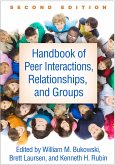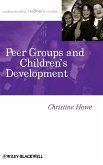Xinyin Chen / Doran C. French / Barry H. Schneider (eds.)
Peer Relationships in Cultural Context
Herausgeber: Chen, Xinyin; Schneider, Barry H.; French, Doran C.
Xinyin Chen / Doran C. French / Barry H. Schneider (eds.)
Peer Relationships in Cultural Context
Herausgeber: Chen, Xinyin; Schneider, Barry H.; French, Doran C.
- Gebundenes Buch
- Merkliste
- Auf die Merkliste
- Bewerten Bewerten
- Teilen
- Produkt teilen
- Produkterinnerung
- Produkterinnerung
This book is devoted specifically to culture and children's peer relationships. The chapters explore different issues in peer relationships (e.g., theories, emotions, behaviors, friendship, parental influences) using multiple methodologies and diverse populations. Authors have focused on how social and cultural context may influence the processes of peer interactions and the development of peer relationships. We expect that the book will serve as a primary resource for scholars, researchers, graduate students and senior undergraduate students in psychology, sociology, and cultural…mehr
Andere Kunden interessierten sich auch für
![Handbook of Peer Interactions, Relationships, and Groups Handbook of Peer Interactions, Relationships, and Groups]() Handbook of Peer Interactions, Relationships, and Groups109,99 €
Handbook of Peer Interactions, Relationships, and Groups109,99 €![Peer-Impact Diagnosis and Therapy Peer-Impact Diagnosis and Therapy]() Vivian Center SeltzerPeer-Impact Diagnosis and Therapy65,99 €
Vivian Center SeltzerPeer-Impact Diagnosis and Therapy65,99 €![Peer Groups and Children's Development Peer Groups and Children's Development]() Christine HowePeer Groups and Children's Development55,99 €
Christine HowePeer Groups and Children's Development55,99 €![Online Peer Engagement in Adolescence Online Peer Engagement in Adolescence]() Online Peer Engagement in Adolescence204,99 €
Online Peer Engagement in Adolescence204,99 €![Family-Peer Relationships Family-Peer Relationships]() Family-Peer Relationships261,99 €
Family-Peer Relationships261,99 €![Peer Groups Childrens Development Peer Groups Childrens Development]() Christine HowePeer Groups Childrens Development121,99 €
Christine HowePeer Groups Childrens Development121,99 €![Understanding Peer Influence in Children and Adolescents Understanding Peer Influence in Children and Adolescents]() Understanding Peer Influence in Children and Adolescents70,99 €
Understanding Peer Influence in Children and Adolescents70,99 €-
-
-
This book is devoted specifically to culture and children's peer relationships. The chapters explore different issues in peer relationships (e.g., theories, emotions, behaviors, friendship, parental influences) using multiple methodologies and diverse populations. Authors have focused on how social and cultural context may influence the processes of peer interactions and the development of peer relationships. We expect that the book will serve as a primary resource for scholars, researchers, graduate students and senior undergraduate students in psychology, sociology, and cultural anthropology, who are interested in peer relationships and cross-cultural human development.
Hinweis: Dieser Artikel kann nur an eine deutsche Lieferadresse ausgeliefert werden.
Hinweis: Dieser Artikel kann nur an eine deutsche Lieferadresse ausgeliefert werden.
Produktdetails
- Produktdetails
- Verlag: Cambridge University Press
- Seitenzahl: 536
- Erscheinungstermin: 18. Mai 2006
- Englisch
- Abmessung: 286mm x 221mm x 33mm
- Gewicht: 1592g
- ISBN-13: 9780521842075
- ISBN-10: 0521842077
- Artikelnr.: 22388233
- Herstellerkennzeichnung
- Libri GmbH
- Europaallee 1
- 36244 Bad Hersfeld
- gpsr@libri.de
- Verlag: Cambridge University Press
- Seitenzahl: 536
- Erscheinungstermin: 18. Mai 2006
- Englisch
- Abmessung: 286mm x 221mm x 33mm
- Gewicht: 1592g
- ISBN-13: 9780521842075
- ISBN-10: 0521842077
- Artikelnr.: 22388233
- Herstellerkennzeichnung
- Libri GmbH
- Europaallee 1
- 36244 Bad Hersfeld
- gpsr@libri.de
Xinyin Chen received his Ph.D. from University of Waterloo in 1992. He is currently a Professor in the Department of Psychology at the University of Western Ontario. He has received a William T. Grant Scholars Award and several other academic awards. In collaborating with his international colleagues, he has been conducting several large-scale, cross-cultural longitudinal projects in Canada, China and other countries. He is a member of the American Psychological Association (APA), International Society for the Study of Behavioral Development (ISSBD), and the Society for Research in Child Development (SRCD). He has published a number of book chapters and articles concerning culture, children's social behaviors and peer relationships, and parental socialization practices. His work has been published in major developmental journals such as Child Development, Developmental Psychology, Merrill-Palmer Quarterly and International Journal of Behavioral Development.
Doran C. French is a Professor and Department Chair of Psychology at Illinois Wesleyan University. He received his Ph.D. from the University of Minnesota in 1980. He has published articles and book chapters on various aspects of children's peer relationships including cross-age interaction, sociometric status, developmental psychopathology, school adjustment, aggression, and friendship. His research on culture and peer relationship dates from the time of his Fulbright fellowship in Indonesia. Since that time, he has collaborated with colleagues in Indonesia and S. Korea to study social status, aggression, conflict and friendship, work that has been published in Child Development, Social Development, Merrill-Palmer Quarterly, and the Minnesota Symposium on Child Psychology.
Barry H. Schneider is Professor of Psychology and Vice-Dean of Research (Social Sciences) at the University of Ottawa, Canada, where he has taught since 1981. Since that time, he has received several professional awards, including Professor of the Year, Bea Wickett Award for an outstanding contribution to mental health in education, and fellow status with the Canadian Psychological Association. In addition to his research in Canada, he has worked in Costa Rica, Cuba, France, Hungary, and Italy. Dr Schneider is the author of three books, Friends and Enemies: Peer Relations in Childhood (London, Arnold, 2000); Children's Social Competence in Context: The Contributions of Families, Schools, and Cultures (Oxford, Pergamon, 1993); and The Gifted Child in Social Context (New York: Springer-Verlag, 1987). He is also the senior editor of two edited volumes in peer relations: Social Competence in Developmental Perspective (with Attili, Nadel Weissberg; Dordrecht, NL: Kluwer, 1989) and Children's Peer Relations: Issues in Asssessment and Intervention (with Rubin Ledingham, New York: Springer Verlag, 1985.
Doran C. French is a Professor and Department Chair of Psychology at Illinois Wesleyan University. He received his Ph.D. from the University of Minnesota in 1980. He has published articles and book chapters on various aspects of children's peer relationships including cross-age interaction, sociometric status, developmental psychopathology, school adjustment, aggression, and friendship. His research on culture and peer relationship dates from the time of his Fulbright fellowship in Indonesia. Since that time, he has collaborated with colleagues in Indonesia and S. Korea to study social status, aggression, conflict and friendship, work that has been published in Child Development, Social Development, Merrill-Palmer Quarterly, and the Minnesota Symposium on Child Psychology.
Barry H. Schneider is Professor of Psychology and Vice-Dean of Research (Social Sciences) at the University of Ottawa, Canada, where he has taught since 1981. Since that time, he has received several professional awards, including Professor of the Year, Bea Wickett Award for an outstanding contribution to mental health in education, and fellow status with the Canadian Psychological Association. In addition to his research in Canada, he has worked in Costa Rica, Cuba, France, Hungary, and Italy. Dr Schneider is the author of three books, Friends and Enemies: Peer Relations in Childhood (London, Arnold, 2000); Children's Social Competence in Context: The Contributions of Families, Schools, and Cultures (Oxford, Pergamon, 1993); and The Gifted Child in Social Context (New York: Springer-Verlag, 1987). He is also the senior editor of two edited volumes in peer relations: Social Competence in Developmental Perspective (with Attili, Nadel Weissberg; Dordrecht, NL: Kluwer, 1989) and Children's Peer Relations: Issues in Asssessment and Intervention (with Rubin Ledingham, New York: Springer Verlag, 1985.
Introduction; 1. Culture and peer relationships Xinyin Chen, Doran C.
French and Barry H. Schneider; Part I. Culture and Peer Relationships:
Theoretical and Methodological Issues: 2. Children's social behaviors and
peer interactions in diverse cultures Carolyn Pope Edwards, Maria Rosario
T. de Guzman, Jill Brown and Asiye Kumru; 3. Cultural influences on peer
relations: an ecological perspective Anne Marie Tietjen; 4. Analytic
considerations in cross-cultural research on peer relations Noel A. Card
and Todd D. Little; 5. Qualitative research on children's peer relations in
cultural context William A. Corsaro; Part II. Temperamental and Emotional
Influences on Peer Relationships: 6. Temperament, socio-emotional
functioning and peer relationships in Chinese and North American children
Xinyin Chen, Li Wang and Amanda DeSouza; 7. Emotional aspects of peer
relations among children in rural Nepal Pamela Cole, Alisha Walker and
Mukta S. Lama-Tamang; 8. Emotion, emotion-related regulation, and social
functioning Nancy Eisenberg, Qing Zhou, Jeffrey Liew, Claire Champion and
Sri Untari Pidada; Commentary I: 9. Temperamental and emotional influences
on peer relationships Joan Stevenson-Hinde; Part III. Peers and Parents:
10. Parenting and peer-group behavior in cultural context David A. Nelson,
Larry J. Nelson, Craig H. Hart, Chongming Yang and Shenghua Jin; 11. Real
and symbolic entry of children in the social world of peers and
parent-child interactions: cultural and cross-cultural aspects Paul
Goudena; 12. Culture, family contexts and children's coping strategies in
peer interactions Yiyuan Xu, Jo Ann Farver, Lei Chang, Lidong Yu and
Zengxiu Zhang; Part IV. Peer Interactions and Social Behaviors: 13. The
cultural organization of Yucatec Mayan children's social interactions
Suzanne Gaskins; 14. Cross-cultural differences in competition amongst
children and adolescents Barry H. Schneider, Maria del Pilar Soteras de
Toro, Sharon Woodburn, Marta Fulop, Consuelo Cervino, Seth Bernstein and
Monica Sandor; 15. Ethnic peer discrimination and psychological well-being
among early adolescents Maykel Verkuyten; Commentary II: 16. On
hand-holding, spit, and the 'big tickets': a commentary on research from a
cultural perspective Kenneth H. Rubin; Part V. Friendships: 17. Friendships
of Indonesian, S. Korean and United States youth: exclusivity, intimacy,
enhancement of worth, and conflict Doran C. French, Okhwa Lee and Sri
Pidada; 18. The cultural practice of close friendships among urban
adolescents in the United States Niobe Way; 19. Latino-heritage
adolescents' friendships Margarita Azmitia, Angela Ittel and Charlotte
Brenk; 20. The cultural context of children and adolescents: peer
relationships and intimate friendships among Arab and Jewish children in
Israel Ruth Sharabany; Commentary III: 21. Peers and culture: details,
local knowledge, and essentials William M. Bukowski and Ryan Adams;
Conclusion: peer relationships in cultural perspective: methodological
reflections Barry H. Schneider, Doran C. French and Xinyin Chen.
French and Barry H. Schneider; Part I. Culture and Peer Relationships:
Theoretical and Methodological Issues: 2. Children's social behaviors and
peer interactions in diverse cultures Carolyn Pope Edwards, Maria Rosario
T. de Guzman, Jill Brown and Asiye Kumru; 3. Cultural influences on peer
relations: an ecological perspective Anne Marie Tietjen; 4. Analytic
considerations in cross-cultural research on peer relations Noel A. Card
and Todd D. Little; 5. Qualitative research on children's peer relations in
cultural context William A. Corsaro; Part II. Temperamental and Emotional
Influences on Peer Relationships: 6. Temperament, socio-emotional
functioning and peer relationships in Chinese and North American children
Xinyin Chen, Li Wang and Amanda DeSouza; 7. Emotional aspects of peer
relations among children in rural Nepal Pamela Cole, Alisha Walker and
Mukta S. Lama-Tamang; 8. Emotion, emotion-related regulation, and social
functioning Nancy Eisenberg, Qing Zhou, Jeffrey Liew, Claire Champion and
Sri Untari Pidada; Commentary I: 9. Temperamental and emotional influences
on peer relationships Joan Stevenson-Hinde; Part III. Peers and Parents:
10. Parenting and peer-group behavior in cultural context David A. Nelson,
Larry J. Nelson, Craig H. Hart, Chongming Yang and Shenghua Jin; 11. Real
and symbolic entry of children in the social world of peers and
parent-child interactions: cultural and cross-cultural aspects Paul
Goudena; 12. Culture, family contexts and children's coping strategies in
peer interactions Yiyuan Xu, Jo Ann Farver, Lei Chang, Lidong Yu and
Zengxiu Zhang; Part IV. Peer Interactions and Social Behaviors: 13. The
cultural organization of Yucatec Mayan children's social interactions
Suzanne Gaskins; 14. Cross-cultural differences in competition amongst
children and adolescents Barry H. Schneider, Maria del Pilar Soteras de
Toro, Sharon Woodburn, Marta Fulop, Consuelo Cervino, Seth Bernstein and
Monica Sandor; 15. Ethnic peer discrimination and psychological well-being
among early adolescents Maykel Verkuyten; Commentary II: 16. On
hand-holding, spit, and the 'big tickets': a commentary on research from a
cultural perspective Kenneth H. Rubin; Part V. Friendships: 17. Friendships
of Indonesian, S. Korean and United States youth: exclusivity, intimacy,
enhancement of worth, and conflict Doran C. French, Okhwa Lee and Sri
Pidada; 18. The cultural practice of close friendships among urban
adolescents in the United States Niobe Way; 19. Latino-heritage
adolescents' friendships Margarita Azmitia, Angela Ittel and Charlotte
Brenk; 20. The cultural context of children and adolescents: peer
relationships and intimate friendships among Arab and Jewish children in
Israel Ruth Sharabany; Commentary III: 21. Peers and culture: details,
local knowledge, and essentials William M. Bukowski and Ryan Adams;
Conclusion: peer relationships in cultural perspective: methodological
reflections Barry H. Schneider, Doran C. French and Xinyin Chen.
Introduction; 1. Culture and peer relationships Xinyin Chen, Doran C.
French and Barry H. Schneider; Part I. Culture and Peer Relationships:
Theoretical and Methodological Issues: 2. Children's social behaviors and
peer interactions in diverse cultures Carolyn Pope Edwards, Maria Rosario
T. de Guzman, Jill Brown and Asiye Kumru; 3. Cultural influences on peer
relations: an ecological perspective Anne Marie Tietjen; 4. Analytic
considerations in cross-cultural research on peer relations Noel A. Card
and Todd D. Little; 5. Qualitative research on children's peer relations in
cultural context William A. Corsaro; Part II. Temperamental and Emotional
Influences on Peer Relationships: 6. Temperament, socio-emotional
functioning and peer relationships in Chinese and North American children
Xinyin Chen, Li Wang and Amanda DeSouza; 7. Emotional aspects of peer
relations among children in rural Nepal Pamela Cole, Alisha Walker and
Mukta S. Lama-Tamang; 8. Emotion, emotion-related regulation, and social
functioning Nancy Eisenberg, Qing Zhou, Jeffrey Liew, Claire Champion and
Sri Untari Pidada; Commentary I: 9. Temperamental and emotional influences
on peer relationships Joan Stevenson-Hinde; Part III. Peers and Parents:
10. Parenting and peer-group behavior in cultural context David A. Nelson,
Larry J. Nelson, Craig H. Hart, Chongming Yang and Shenghua Jin; 11. Real
and symbolic entry of children in the social world of peers and
parent-child interactions: cultural and cross-cultural aspects Paul
Goudena; 12. Culture, family contexts and children's coping strategies in
peer interactions Yiyuan Xu, Jo Ann Farver, Lei Chang, Lidong Yu and
Zengxiu Zhang; Part IV. Peer Interactions and Social Behaviors: 13. The
cultural organization of Yucatec Mayan children's social interactions
Suzanne Gaskins; 14. Cross-cultural differences in competition amongst
children and adolescents Barry H. Schneider, Maria del Pilar Soteras de
Toro, Sharon Woodburn, Marta Fulop, Consuelo Cervino, Seth Bernstein and
Monica Sandor; 15. Ethnic peer discrimination and psychological well-being
among early adolescents Maykel Verkuyten; Commentary II: 16. On
hand-holding, spit, and the 'big tickets': a commentary on research from a
cultural perspective Kenneth H. Rubin; Part V. Friendships: 17. Friendships
of Indonesian, S. Korean and United States youth: exclusivity, intimacy,
enhancement of worth, and conflict Doran C. French, Okhwa Lee and Sri
Pidada; 18. The cultural practice of close friendships among urban
adolescents in the United States Niobe Way; 19. Latino-heritage
adolescents' friendships Margarita Azmitia, Angela Ittel and Charlotte
Brenk; 20. The cultural context of children and adolescents: peer
relationships and intimate friendships among Arab and Jewish children in
Israel Ruth Sharabany; Commentary III: 21. Peers and culture: details,
local knowledge, and essentials William M. Bukowski and Ryan Adams;
Conclusion: peer relationships in cultural perspective: methodological
reflections Barry H. Schneider, Doran C. French and Xinyin Chen.
French and Barry H. Schneider; Part I. Culture and Peer Relationships:
Theoretical and Methodological Issues: 2. Children's social behaviors and
peer interactions in diverse cultures Carolyn Pope Edwards, Maria Rosario
T. de Guzman, Jill Brown and Asiye Kumru; 3. Cultural influences on peer
relations: an ecological perspective Anne Marie Tietjen; 4. Analytic
considerations in cross-cultural research on peer relations Noel A. Card
and Todd D. Little; 5. Qualitative research on children's peer relations in
cultural context William A. Corsaro; Part II. Temperamental and Emotional
Influences on Peer Relationships: 6. Temperament, socio-emotional
functioning and peer relationships in Chinese and North American children
Xinyin Chen, Li Wang and Amanda DeSouza; 7. Emotional aspects of peer
relations among children in rural Nepal Pamela Cole, Alisha Walker and
Mukta S. Lama-Tamang; 8. Emotion, emotion-related regulation, and social
functioning Nancy Eisenberg, Qing Zhou, Jeffrey Liew, Claire Champion and
Sri Untari Pidada; Commentary I: 9. Temperamental and emotional influences
on peer relationships Joan Stevenson-Hinde; Part III. Peers and Parents:
10. Parenting and peer-group behavior in cultural context David A. Nelson,
Larry J. Nelson, Craig H. Hart, Chongming Yang and Shenghua Jin; 11. Real
and symbolic entry of children in the social world of peers and
parent-child interactions: cultural and cross-cultural aspects Paul
Goudena; 12. Culture, family contexts and children's coping strategies in
peer interactions Yiyuan Xu, Jo Ann Farver, Lei Chang, Lidong Yu and
Zengxiu Zhang; Part IV. Peer Interactions and Social Behaviors: 13. The
cultural organization of Yucatec Mayan children's social interactions
Suzanne Gaskins; 14. Cross-cultural differences in competition amongst
children and adolescents Barry H. Schneider, Maria del Pilar Soteras de
Toro, Sharon Woodburn, Marta Fulop, Consuelo Cervino, Seth Bernstein and
Monica Sandor; 15. Ethnic peer discrimination and psychological well-being
among early adolescents Maykel Verkuyten; Commentary II: 16. On
hand-holding, spit, and the 'big tickets': a commentary on research from a
cultural perspective Kenneth H. Rubin; Part V. Friendships: 17. Friendships
of Indonesian, S. Korean and United States youth: exclusivity, intimacy,
enhancement of worth, and conflict Doran C. French, Okhwa Lee and Sri
Pidada; 18. The cultural practice of close friendships among urban
adolescents in the United States Niobe Way; 19. Latino-heritage
adolescents' friendships Margarita Azmitia, Angela Ittel and Charlotte
Brenk; 20. The cultural context of children and adolescents: peer
relationships and intimate friendships among Arab and Jewish children in
Israel Ruth Sharabany; Commentary III: 21. Peers and culture: details,
local knowledge, and essentials William M. Bukowski and Ryan Adams;
Conclusion: peer relationships in cultural perspective: methodological
reflections Barry H. Schneider, Doran C. French and Xinyin Chen.








